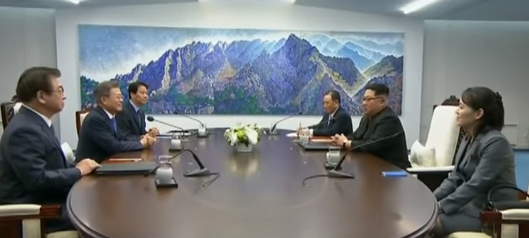By Natalia Castro
For nearly 70 years, conflict surrounding North Korea, South Korea, and the United States has put countless lives at risk and left U.S.-North Korean relations in a cold limbo. Over the last decade, North Korea has become an increasingly volatile threat as it has pushed for nuclear weapons, but now that changed this year with heightened pressure from the United States. In a historic step, North and South Korea have agreed to come together in the first real diplomatic breakthrough since the end of the Cold War, setting the path for victory for every actor.
For the first time since the physical end of the Korean War, North Korean Supreme Leader Kim Jong-un and South Korean President Moon Jae-in walked between the two territories and committed to a peace negotiation. The meeting preempts a summit between President Trump and Kim which, if successful, could lead to the formal end of the Korean War and the denuclearization of the Korean Peninsula, which the two declared to be common goals.
The U.S. and North Korea have had a long and troubled history, and no U.S. leader has been able to produce a favorable outcome between the two nations, yet now, international leaders are praising President Trump for his ability to unite the countries.
Japanese Prime Minister Shinzo Abe explained during his April visit to the U.S. that Trump has “successfully forged a mutual understanding” after “very in-depth discussions” on North Korea and has credited Trump with demonstrating “unwavering determination in addressing the challenge” of North Korea.
Abe has been a firm supporter of Trump’s aggressive approach toward North Korea.
Just a few months ago, Kim was threatening missiles against Guam and was rapidly working toward a nuclear-tipped missile force. President Trump responded by threatening to unleash “fire and fury” upon North Korea if an attack actualized. Within weeks, the United Nations Security Council unanimously adopted a new sanctions resolution against North Korea, showing the willingness of Trump to follow through on aggressive steps against the country.
This sharply contrasted the actions of the Obama Administration, which took a tempered down, more diplomatic route toward the country. In fact, when Trump adopted this “fire and fury” policy, former Director of National Intelligence James Clapper, who served under former President Barack Obama, criticized Trump. Clapper told CNN’s “Anderson Cooper 360,” “We need to tone down the rhetoric of regime change and all this. As desirable as that may be, all that does is amp up the paranoia.”
But this strategy did not amp up paranoia for anyone except Kim Jong-un, which finally allowed diplomacy to be possible.
The newly confirmed Secretary of State Mike Pompeo recently disclosed that he had met with Kim Jong-un in early April to discuss the ending of North Korea’s nuclear weapons programs.
In Pompeo’s first press conference, he explained, “We would not be where we are today without President Trump’s maximum pressure campaign and the work that has been done all around the world to apply pressure to North Korea… The economic pressure that has been put in place by this global effort that President Trump has led… [Kim Jong-un] to believe that it is in his best interest to come to the table and talk about denuclearization.”
Pompeo has admitted challenges still lie ahead, as trust with North Korea remains low, but with a serious threat of force from the U.S., resolution can be possible.
Americans for Limited Government President Rick Manning explained in a press release, “In order to show that they are sincere in their desire for peace, the North Koreans need to release the three Americans still being held hostage by the regime, followed closely by providing a full accounting of the North Korean nuclear and ballistic missile programs and U.S. inspectors must be part of the inspection teams throughout the denuclearization process. Once the peninsula is nuclear free, the U.S. can begin the process of bringing our troops home from South Korea.”
The conflict between North Korea and South Korea and the United States is not yet over, but thanks to the efforts by the Trump administration, it has taken a significant step toward resolution. If North Korea is serious about the prospects of peace, the U.S. is ready to have its demands met and lead the global effort toward a denuclearized Korean Peninsula.
Natalia Castro is a contributing editor at Americans for Limited Government.







